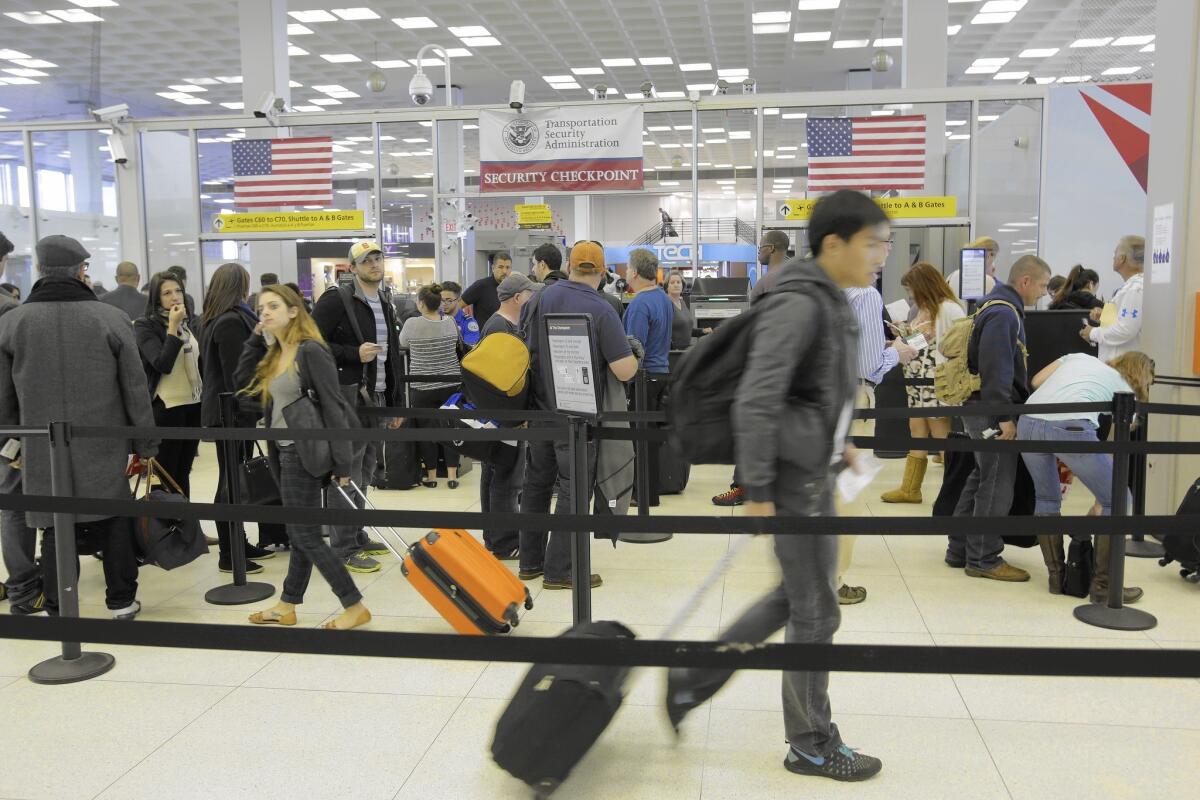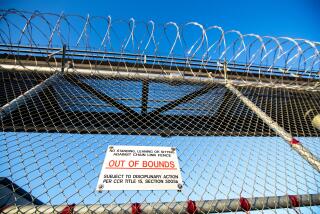New U.S. racial profiling standards, not yet released, disappoint some

Recalling his own encounters with police as a young black man, Atty. Gen. Eric H. Holder Jr. has struggled for five years to toughen limits on racial profiling by law enforcement agencies.
Now, weeks from retirement as the nation’s top law enforcement officer, Holder is preparing to unveil his long-delayed guidelines at a delicate moment, just as the nation is convulsed with demonstrations over the killing of unarmed black men at the hands of white police officers.
Holder has held out the anti-profiling rules as a key part of the federal response to rising racial tensions, but disappointment is already growing among some lawmakers and civil rights groups who say that the new policy — expected to be announced as soon as Monday — doesn’t go far enough.
The guidelines for the first time will extend a ban on profiling based on race and ethnicity to ban profiling based on religion, national origin, gender, and gender identity. But the changes will not apply broadly to local law enforcement officers, as the American Civil Liberties Union, and Sens. Richard J. Durbin (D-Ill.) and Benjamin Cardin (D-Md.) had sought. Local police have been at the center of recent controversies in Ferguson, Mo., New York City and Cleveland.
Civil rights groups had hoped that Holder would tie the new regulations more broadly to local law enforcement agencies, perhaps by requiring police departments to abide by them as a condition for receiving federal grants.
But local law enforcement officers will be required to follow the rules when working with federal investigators, according to a government official who was not authorized to speak about guidelines that have not been announced.
Also, despite White House pressure to ensure that the rules covered all federal law enforcement agencies, key activities by customs, border patrol and Transportation Security Administration officers will be exempted, according to senior Department of Homeland Security officials familiar with the new policy.
That means, for example, Mexican Americans living or working near the border can still be stopped based solely on their ethnicity and asked for identification.
At airports, TSA agents will be allowed to continue to stop passengers based on their nationality or ethnicity if there is intelligence about a potential threat, according to the government official.
The rules will close some national security loopholes allowed under a set of 2003 anti-profiling regulations, which officials characterized as a major change.
But the new guidelines will continue to allow the FBI and other federal agencies to “map” communities for certain investigative purposes based on religion or ethnicity. That exception has particularly concerned civil libertarians and advocates for Muslim Americans.
One senior Democratic aide in the Senate, who had not seen the final guidelines but has been closely involved, was skeptical of how much progress they would represent.
“There are some positive changes but those changes are largely superficial and the real test of this guidance is whether it will actually change federal law enforcement practices,” said the aide, who did not want to be identified publicly criticizing Holder’s policy. “My sense at this point is that it will not.”
A Justice Department spokesman could not be reached for comment. But a government official familiar with the guidelines called the changes “gigantic,” adding that “this whole policy should be seen as raising the bar for everything.”
Earlier this week, in a speech about the Justice Department’s response to the Aug. 9 police shooting of Michael Brown in Ferguson, Holder promised “rigorous new standards” on profiling that would “help end racial profiling once and for all.”
Most disappointing to many civil rights leaders was the partial exemption for certain activities along the border and at airports. Laura Murphy, head of the ACLU’s Washington office, said the exceptions would perpetrate a “Constitution-free zone” within 100 miles of the Mexican and Canadian borders, where someone can be stopped for simply looking as if they are Latino.
“It shouldn’t be that everyday Mexican Americans who pay their taxes get stopped and the white ranchers don’t,” Murphy said.
The new guidelines for the first time will cover the Department of Homeland Security, even if some of its activities are excepted. “The application of this policy [to Homeland Security] is being vastly expanded,” said one department official. “There are huge swaths of [the agency] that previously were not subject to the old policy that will be subject to it now.”
But civil rights leaders said they fear the new guidelines will create confusion, with different regulations applying to different federal agents and discrepancies between local and federal policies.
“There is a need for a uniform national standard against profiling,” said Farhana Khera, president of Muslim Advocates, a legal advocacy group in Washington. “You can’t totally disassociate federal law enforcement from state and local,” she said. “Having a federal agency using one standard and their colleagues another is very dangerous.”
President George W. Bush issued guidelines banning racial profiling by federal law enforcement in 2003. But they contained two major loopholes for national security matters and border patrol, which advocates termed the “Muslim loophole” and “Latino loophole.”
Holder set out to close the national security loophole and expand the banned profiling categories to include religion, ethnicity and sexual orientation for the FBI and other Justice Department agencies.
But he met concerted opposition from national security officials. Although the new guidelines will technically eliminate the national security exemption, congressional sources said many of the same policies will be allowed to continue under a different part of the guidance.
There would be occasions where using race, religion or the other banned characteristics would be allowed during an investigation, but it would have to be tied to a specific criminal incident, scheme or organization or a specific threat to national security, the government official familiar with the guidelines said. Intelligence activities by the CIA would not be covered.
Holder was set to issue the new guidelines for Justice Department personnel earlier this year when Durbin and the ACLU interceded, persuading the White House to tell Holder to expand the scope to include Homeland Security and other federal law enforcement agencies, setting off a struggle with Homeland Security.
Twitter: timphelpsLAT, @ByBrianBennett
More to Read
Start your day right
Sign up for Essential California for news, features and recommendations from the L.A. Times and beyond in your inbox six days a week.
You may occasionally receive promotional content from the Los Angeles Times.







